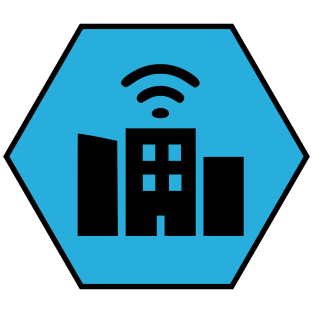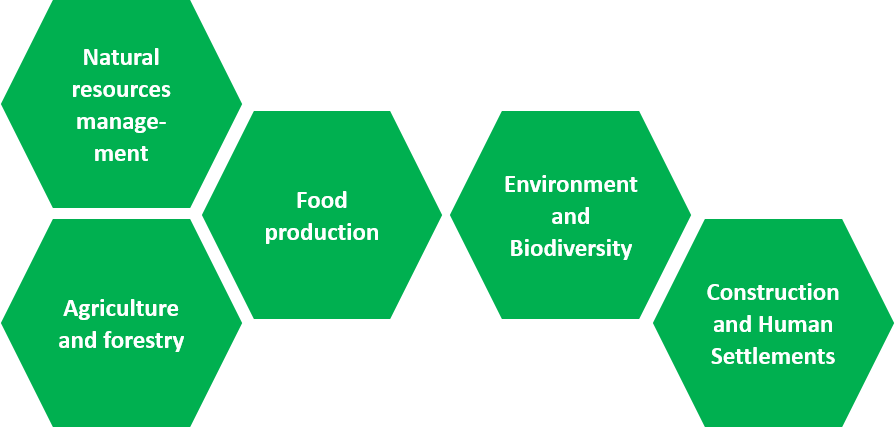The aim of the Smart Cities specialisation domain is to contribute to the sustainable development of human settlements and reduce the negative impacts of climate change.
The domain is included under the thematic area Sustainable agriculture and environmental sectors.

Why are Smart cities included among the RIS3 priorities?
- The application of key enabling and advanced technologies is becoming increasingly important in human settlements
- Technologies penetrate the public space and influence people's daily lives
- As in all other application sectors, digital technologies (including ICT and artificial intelligence) are developing rapidly
- Climate change and the impact of a changing climate on the city environment requires changes in the management of city governance and bigger use of natural resources
- Many functions of the city can be managed more efficiently with the use of sensors, automation and regulation
- Increasing social and political demand for sustainable development, the use of materials from renewable sources and secondary raw materials, and the minimisation of the negative impact of human activities on the environment;
- The need to reduce energy consumption and optimise energy use is creating demand for a larger use of renewable resources, reduction of greenhouse gas emissions and influencing the temperature in the city
Application sectors in the thematic area
The thematic area Sustainable Agriculture and Environmental Sectors comprises five application sectors:
- Sustainable management of natural resources (Natural resource management)
- Sustainable agriculture and forestry (Agriculture and forestry)
- Sustainable food production (Food production)
- Ensuring a healthy and quality environment, biodiversity and natural resource ecology (Environment and Biodiversity)
- Sustainable construction, human settlements and technical environmental protection (Construction and Human Settlements).
Strategic themes for research and innovation in application sectors
The Smart Cities domain specified three strategic themes in the application sectors:
- Digitalisation and systemic interconnection of structure and natural environment
- Sustainability and decarbonisation
- Resilience
Digitalisation and systemic interconnection of structure and natural environment
This theme/sector/area is based on digitalisation and systemic interconnection of different types of infrastructures with the natural environment. The area deals with research and development of tools for modelling and simulating territorial units (decarbonisation, urban design, digital support for spatial planning, with emphasis on minimising impacts on the quality of life of inhabitants and creating resilient landscapes), “smart” environment, “smart” infrastructure, including the development of efficient digital infrastructure
Sustainability and decarbonisation
This is a theme/sector/area that deals with the sustainability of territorial units in the economic, environmental and social spheres. The area is dedicated to research and development of tools and measures to increase the sustainability of neighbourhoods, villages, city districts to entire cities and regions.
Resilience
This theme/sector/area that deals with the issue of resilience of territorial units, such as against natural disasters, climate change, cyber-attacks, power outages, social threats through cyberspace, etc. The area is dedicated to research and development of various tools and measures to increase the resilience and selfreliance of neighbourhoods, villages, city districts to entire cities and regions.

Key enabling technologies in the Smart Cities domain
In this domain, the following key enabling technologies are particularly applicable. Each of them can be used to innovate in all application sectors belonging to this domain, but also in other areas.
- Photonics and micro-/nano-electronics
- Advanced materials and nanotechnology
- Biotechnology
- Advanced manufacturing technologies
- Artificial Intelligence
- Digital security and connectivity
The specific research and innovation themes for key enabling technologies in this domain can be found in Annex 1 to the National RIS3.
More detailed general information on key enabling technologies can be found here.
Themes concerning social sciences, humanities and arts in the Smart Cities domain
The following SSHA themes will be explored and developed in this domain:
More detailed general information on the themes of social sciences, humanities and arts be found here.
National Innovation Platform Sustainable Agriculture and Environmental Sector
National Innovation Platforms are working groups where the entrepreneurial discovery process (EDP) is put into practice.
The Smart Cities domain is the subject of discussions in the National Innovation Platform VI - Sustainable Agriculture and Environmental Sector, where representatives of the business, research and public spheres meet; this is known as the Triple Helix model.
Contacts:
Professional guarantor of National Innovation Platform VI - Sustainable Agriculture and Environmental Sector: Miroslav Svítek, Professional guarantor of the specialisation domain - Department of Transport Telematics, svitek@fd.cvut.cz
Secretary of National Innovation Platform VI - Sustainable Agriculture and Environmental Sector: Ivana Križanová, MIT CR, krizanova.ivana@mpo.cz

